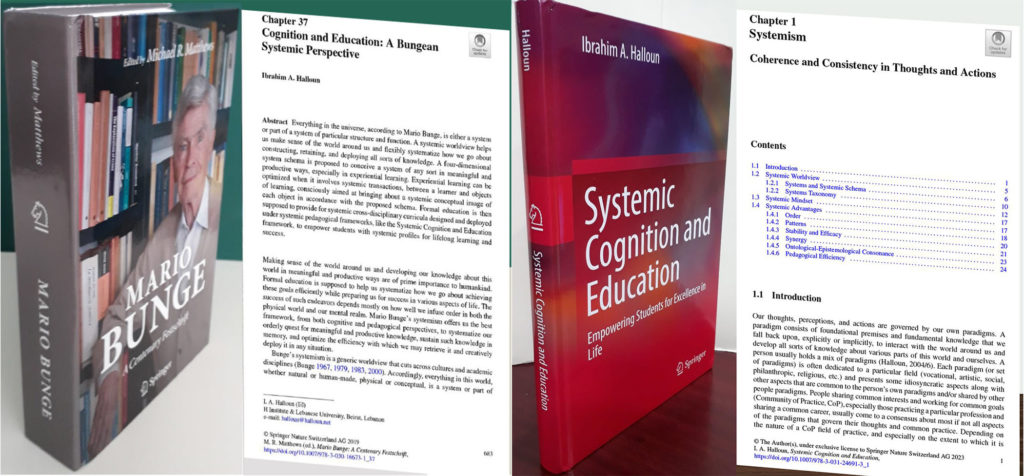Systems thinking for coherence and consistency in thoughts and actions
.

.
Systemism is a worldview and a mindset. With a systemic worldview, we conceive everything within us and around us as consisting of interacting physical or conceptual systems or parts of systems (or of subsystems). Simply put, a system is an ordered unit or totality consisting of interconnected and interdependent physical or conceptual entities that come together or that are brought together in order to serve specific purposes under specific conditions. With a systemic mindset, we learn about, interact with, and modify both the physical world and the abstract realm of our own invention through appropriate conceptual systems that we construct to represent and investigate patterns of interest in either world or realm, and/or to make changes in these patterns or bring about new patterns altogether.
Systemism allows us, among others, to:
- Infuse order in our thoughts and actions, and subsequently proceed systematically and efficiently in every endeavor we assume.
- Readily cope with our rapidly changing world, and proceed to this end through disciplinary convergence that is about bringing knowledge coherently together from different disciplines in order to tackle complex issues.
- Bring synergy to our interaction with others, optimize the governance of our institutions, and subsequently achieve any collective endeavor with outcomes of unsurpassed value.
- Shape our educational systems and individual institutions to empower students for excellence in life.
.
.

.
Select Publications:
.
Systemism: A synopsis. (2019/2022). Working paper.
Systemism offers us the best framework to systematize and infuse order in our everlasting quest to make sense of the world around us and develop and deploy our knowledge about this world in meaningful and productive ways. It also helps us optimize our engagement with others, and bring about processes and products that none of us can produce on her/his own independently from others. Full Text
.
Éducation systémique universelle pour le 21e siècle et au-delà (Décembre 2020)
L’Assemblée Générale des Nations Unies (2015), dans son quatrième objectif de développement durable (ODD4), et la Commission internationale sur « Les futurs de l’éducation » (2020) considèrent l’éducation comme un « bien commun » de qualité, fondé sur l’équité, l’inclusion et la solidarité, assurant un apprentissage tout au long de la vie pour l’épanouissement individuel et collectif. Cette fin requiert, comme par la Déclaration d’Incheon (UNESCO, 2015), des « initiatives audacieuses et novatrices » qui mènent à des changements significatifs, voire radicaux, dans les systèmes éducatifs, les établissements d’enseignement, les curricula, et les divers concepts et pratiques en rapport avec l’éducation formelle et non formelle. Le systémisme se prête bien à un tel défi. Effectuée systématiquement sous gouvernance systémique et dans le contexte de curricula systémiques, l’éducation pourrait bien alors devenir un bien commun universel dans un monde post-Covid. Texte intégral
.

.
Creativity, problem solving, critical thinking: Are they all skills? (February 2023).
A mix-up prevails in the educational literature within and among unidimensional and multidimensional knowledge aspects. Precise knowledge taxonomy based on sound cognitive criteria and cutting across disciplines is necessary to adopt efficient pedagogy for learning and teaching all sorts of knowledge and to design and implement appropriate curricula. Full Text
.
Systemic Education for Sustainable Development. (May 2016. Plenary paper). UNESCO regional meeting on GAP-ESD. Cairo, Egypt. PowerPoint Presentation
.
Mental Capacities between Course Content and Achievement. (April 2014. Plenary paper). NCAHE (Qiyas) Symposium on Distinguished Achievement. Riyadh, KSA. PowerPoint Presentation
.
Toward a Comprehensive Learning Ecology. (October 2012. Plenary paper). Jordanian Ministry of Education Conference on IAB. Amman, Jordan. PowerPoint Presentation
.
.

Systemism for optimal collective synergy and convergence education
.
SPICE: Systemic, Praxis-Immersive, Convergence Education. A Paradigm Shift in Education for Excellence in the 21st Century. (2023).
The world within and around us is a world of systems. Major innovations of our time are the upshots of praxis-based disciplinary convergence, i.e., of bringing together, into generative consonance, theory and practice from different disciplines, especially disciplines from different fields like arts and science. Formal education has thus to opt for paradigms that are in harmony with the systemic nature of the world, particularly of our minds and brains, and that meet the realities of the 21st century, particularly in the job market. Systemic, praxis-immersive, convergence education (SPICE) is proposed to this end. Full Text
.
P-SPICE: Physics for Systemic, Praxis Immersive, Convergence Education. (2022). Physics for Teachers, 2, 3-13.
Formal education should empower students for excellence in the 21st century. To this end, it has to immerse students into praxis with systemic convergence lenses that bring together traditionally distinct fields and disciplines for tackling real life issues. With scientific models (conceptual systems) and modeling (systemic thinking) at the core of their discipline, physics teachers can synergize systemic reform in this direction. Full Text.
.
Systemic, Praxis Immersive, Convergence Education (SPICE) in Higher Education for the 21st Century and Beyond. (May 2021). International Conference on the Future of Learning and Skills, Dubai, UAE.
We live in a rapidly changing world that requires higher education institutions (HEI) to empower students to cope with unprecedented demands and challenges in the workplace and various aspects of life. To this end, Systemic, Praxis Immersive, Convergence Education (SPICE) is proposed whereby HEI: (a) adopt differential convergence education in their majors and curricula, (b) immerse students in insightful, culturally rich praxis, and (c) operate under systemic paradigms that bring about students with 4P systemic profiles. Synopsis & slides
.
Differential Convergence Education from Pluridisciplinarity to Transdisciplinarity. (April 2020).
Five modalities of differential convergence that may be deployed in the context of any curriculum, including discipline-based curricula, are proposed in a systemic perspective. These are, in increasing order of cohesiveness and productivity, pluridisciplinarity, multidisciplinarity, interdisciplinarity, crossdisciplinarity, and transdisciplinarity, with the last two as ultimate modalities for secondary school and university respectively. Full Text
Supplement: Guidelines for systemic differential convergence education. (April 2020)
General guidelines for carrying out differential convergence projects to help students develop efficient competencies for addressing daily life issues from the perspective of many disciplines brought together cohesively and productively from different fields and different realms under systemic pedagogical frameworks.
Please click here to request a complimentary copy of the Supplement.
.
Systemic Convergence in Education: A synopsis. (September 2018). Working paper.
Convergence in education is primarily about bringing together many academic fields to come out with certain pedagogical products and processes that may extend from the solution to a particular type of abstract or real-world problems to a full-fledge curriculum. It can be brought about through a variety of modalities with a diversity of conceptual lenses the most meaningful and efficient of which are crossdisciplinary modalities that rely on systemic lenses. Full Text

